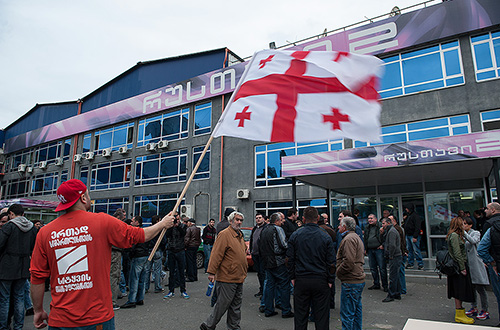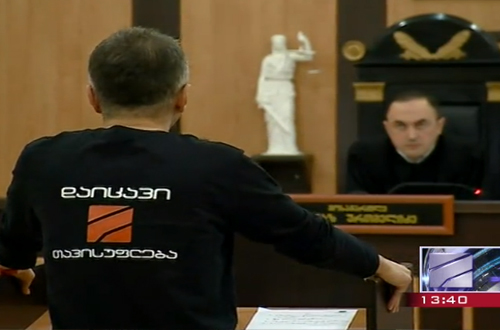Judge Rules in Favor of Ex-Owner in Rustavi 2 TV Ownership Dispute

Supporters of Rustavi 2 TV rally outside the broadcaster’s Tbilisi headquarters on October 22, 2015. Photo: Eana Korbezashvili/Civil.ge
A judge of Tbilisi City Court ruled on Tuesday in favor of Kibar Khalvashi, a former owner of Rustavi 2 TV, who sought reclaiming his shares in the broadcaster through a lawsuit filed in early August.
A lawyer representing respondents, current majority shareholders of Rustavi 2 TV, Zaza Bibilashvili, said that the verdict will be appealed.
It may take about four or six weeks before the ruling goes to the Court of Appeals, Bibilashvili said.
The appellate court’s decision can also be appealed, if the parties in the case decide so, and the final decision, before the verdict is enforced, will be up to the Supreme Court.
The judge, Tamaz Urtmelidze, was still reading out his verdict when lawyers of Rustavi 2 TV walked out of the courtroom in protest against the ruling.
“What happened is exactly what we were predicting – dark dictatorship of [ex-PM] Bidzina Ivanishvili has been formalized. Tamaz Urtmelidze is not a judge, he will definitely be held responsible for he did today,” said lawyer Bibilashvili, who is also a member of the opposition UNM party’s political council; he was referring to allegation that Ivanishvili and the government want to seize Rustavi 2 TV through the lawsuit filed by Khalvashi.
In a written statement released after the verdict was delivered, Kibar Khalvashi said: “What happened today is what I believed in and what I have been fighting for over the past ten years. [Ex-president] Saakashvili, who is no longer the owner of Rustavi 2 TV, has been defeated in the court… Truth has prevailed over a huge evil.”
“The court’s decision is the start of the process of restoration of justice,” he said, adding that whatever the decision of higher courts might be “I am already a victor as I proved my truth through court.”
With his ruling the judge declared contracts through which Khalvashi sold his shares in Rustavi 2 TV in the course of 2005-2006 null and void, and ordered his ownership of the broadcaster to be restored.
Khalvashi, who owned the broadcaster in 2004-2006, filed the lawsuit seeking to reclaim his shares in August. As an interim measure, the court ordered a freeze on Rustavi 2 TV assets in August, which was followed less than two months later with an additional court injunction, which froze assets of Rustavi 2 TV’s shareholder company.
The lawsuit was condemned by Rustavi 2 TV and many opposition parties, with UNM being the most vocal among them, as the government’s attempt to seize the most-watched Georgian broadcaster and a fierce critic of the government’s policies.
- Media Advocacy Coalition’s Statement on Rustavi 2 TV Ownership Dispute
- Rustavi 2 TV Accuses Govt of Blocking Its Funding Deal
- Civil Society Groups on Court’s Order to Freeze Rustavi 2 TV Assets
- Court Orders Rustavi 2 TV Asset Freeze
- One of Ex-Owners in Court Bid to Reclaim Rustavi 2 TV
In his lawsuit, Khalvashi has claimed that he was coerced into selling the television channel by the then-leadership of the country in 2006.
As a piece of evidence, his lawyers presented a report on the valuation of Rustavi 2 TV shares in 2005-2006 through which the plaintiff claimed that the price for which he had to sell his shares were in fact far lower than actual value of the assets. Through this piece of evidence, Khalvashi tried to prove that he would not have sold the broadcaster for the stated price without having been pressured into it.
The valuation, commissioned by the plaintiff, was done by an expert from the Georgian State Forensics Bureau based on inconclusive financial data provided by the plaintiff.
The valuation was done through an asset-based approach as it was more relevant in the condition of scarce financial data, the expert, who was the only witness summoned for questioning during the proceedings, told the court on October 28.
The expert, who compiled the report in September in less than two days, also said that he had not verified authenticity of the provided data as it was not within his competence.
Lawyers representing Rustavi 2 TV and its current majority shareholders sought in vain to exclude the report as invalid evidence on the grounds that it was based on dubious and inconclusive financial data. They also argued that the report was not compiled based on the international valuation standards. The motion was rejected by the judge.
Paata Salia, a lawyer representing the plaintiff, said that the respondents failed to provide arguments to back their claims that the report was based on fake financial data and argued that the respondents also had the burden of proof to substantiate their claims.

A screengrab from TV footage showing Rustavi 2 TV CEO Nika Gvaramia, wearing a t-shirt with broadcaster’s logo and inscription reading “defend freedom”, speaks to Tbilisi City Court judge Tamaz Urtmelidze on October 19, 2015.
Since the start of the court hearing in mid-September, respondents have filed multiple motions requesting judge Tamaz Urtmelidze’s recusal on the grounds of his “bias” in favor of the plaintiff and on the grounds of the government having levers to exert influence on him through criminal proceedings, which were launched against the judge’s mother in connection to a domestic incident that occurred more than a year and nine months ago.
All motions for recusal were rejected by the judge.
The judge was frequently accused by Rustavi 2 TV head, Nika Gvaramia, of being “corrupt” and a stooge of ex-PM Bidzina Ivanishvili. After the judge ordered one the court injunctions, Gvaramia said that “soil will burn under judge Urtmelidze’s feet” and “he will never find a safe haven in this country.” After one of the verbal exchanges with the judge, Gvaramia was ordered to leave the courtroom on October 19 and has not been allowed to attend the hearings since then.
“I have never had to deal with such an absurd case,” Zaza Bibilashvili, the lawyer representing the current majority shareholders of Rustavi 2 TV, told the judge in his closing arguments on November 3.
“There is nothing in this case except Khalvashi’s allegations and two pages printed out from his computer,” said Bibilashvili. “The verdict in favor of the plaintiff would be an unheard of illegality.”
Lawyers representing Rustavi 2 TV told the judge not to yield to government pressure and not to rule in favor of the plaintiff.
Paata Salia, a lawyer representing plaintiff Kibar Khalvashi, said that the respondents were trying to “politicize” the dispute throughout the court proceedings.
“This [lawsuit of Khalvashi] is not against Rustavi 2 TV, nor has it aimed at restricting media freedom or at obstructing Rustavi 2 TV operations,” Salia said. “Respondents’ arguments were politically-charged and I am not going to respond to their political statements… I don’t think the courtroom is the right place for this.”
91 percent of shares in Rustavi 2 TV, which now earns more in advertisement revenue than several of its main competitors combined, are currently owned both directly and indirectly by Levan Karamanishvili and Giorgi Karamanishvili – little-known figures to the wider public in Georgia who are believed to be close associates of former President Mikheil Saakashvili.
Since 2004, Rustavi 2 TV has changed hands multiple times and most of those changes in its ownership structure were intertwined with politics, creating a complex web of controversial deals and a multitude of former owners of which Khalvashi is not the only one who now wants to reclaim the broadcaster. As the channel was passing from one owner to another, every new shareholder was either an ally of then president Mikheil Saakashvili or an offshore firm with beneficiary owners unknown.
Respondents also argue that the current owners of 91 percent shares of Rustavi 2 TV – Levan and Giorgi Karamanishvili, are bona fide holders of the broadcaster. Khalvashi claimed that Saakashvili controls the broadcaster through Giorgi and Levan Karamanishvili, who, he says, are nominal shareholders.
Khalvashi’s lawyer Paata Salia said that the respondents failed to present any evidence, except of printouts from publicly registry of ownership structure, to prove that the current owners are bona fide shareholders.
Rustavi 2 TV lawyers wanted to involve in the litigation as a third party previous shareholders of the Rustavi 2 from which current owners bought shares, but the motion was rejected by the judge.
In his lawsuit Khalvashi also claimed copyright ownership of Rustavi 2 TV logo and several shows the broadcaster was producing at the time when he owned the channel. He was demanding USD 500,000 in compensation for what he claimed was copyright infringements and in addition over USD 18.3 million in reimbursement of lost profit. These claims by Khalvashi were rejected by the judge. Khalvashi’s lawyer said that his client will decide whether to appeal or not this part of the verdict after they receive justification of court’s decision.
This post is also available in: ქართული (Georgian) Русский (Russian)